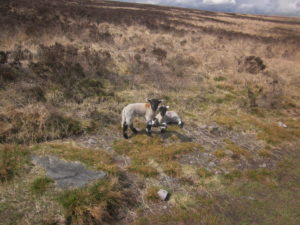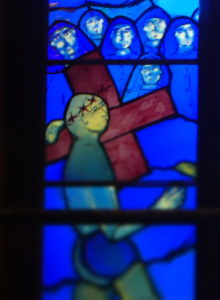The Order of Service:
Order of service as Word file:
21 05 16 7th Sunday of Easter Eucharist
Order of service as PDF file:
21 05 16 7th Sunday of Easter Eucharist
Image by: Rude, CC BY-SA 3.0 https://creativecommons.org/licenses/by-sa/3.0, via Wikimedia Commons.

The Livestreaming Link:
The Readings
Acts 1.15-17, 21-end
In those days Peter stood up among the believers (together the crowd numbered about one hundred and twenty people) and said, ‘Friends, the scripture had to be fulfilled, which the Holy Spirit through David foretold concerning Judas, who became a guide for those who arrested Jesus— for he was numbered among us and was allotted his share in this ministry.’
So one of the men who have accompanied us throughout the time that the Lord Jesus went in and out among us, beginning from the baptism of John until the day when he was taken up from us—one of these must become a witness with us to his resurrection.’ So they proposed two, Joseph called Barsabbas, who was also known as Justus, and Matthias. Then they prayed and said, ‘Lord, you know everyone’s heart. Show us which one of these two you have chosen to take the place in this ministry and apostleship from which Judas turned aside to go to his own place.’ And they cast lots for them, and the lot fell on Matthias; and he was added to the eleven apostles.
John 17.6-19
Jesus said, ‘I have made your name known to those whom you gave me from the world. They were yours, and you gave them to me, and they have kept your word. Now they know that everything you have given me is from you; for the words that you gave to me I have given to them, and they have received them and know in truth that I came from you; and they have believed that you sent me. I am asking on their behalf; I am not asking on behalf of the world, but on behalf of those whom you gave me, because they are yours. All mine are yours, and yours are mine; and I have been glorified in them. And now I am no longer in the world, but they are in the world, and I am coming to you. Holy Father, protect them in your name that you have given me, so that they may be one, as we are one. While I was with them, I protected them in your name that you have given me. I guarded them, and not one of them was lost except the one destined to be lost, so that the scripture might be fulfilled. But now I am coming to you, and I speak these things in the world so that they may have my joy made complete in themselves. I have given them your word, and the world has hated them because they do not belong to the world, just as I do not belong to the world. I am not asking you to take them out of the world, but I ask you to protect them from the evil one. They do not belong to the world, just as I do not belong to the world. Sanctify them in the truth; your word is truth. As you have sent me into the world, so I have sent them into the world. And for their sakes I sanctify myself, so that they also may be sanctified in truth.
New Revised Standard Version Bible: Anglicized Edition, copyright © 1989, 1995 National Council of the Churches of Christ in the United States of America. Used by permission. All rights reserved worldwide. http://nrsvbibles.org
The Sermon
By Siobhan H, Reader at St Mary's.
Glimpses of the Sacred
‘All mine are yours’
‘Keep them’
‘Protect them in my name’
‘So I send them into the world’
These were the phrases which jumped out for me when I first read the Gospel passage we have heard this morning.
In it, Jesus intercedes to his Father on behalf of his disciples. We witness Jesus’ encouragement of them not to dwell in feelings of abandonment or despair, but to hope in the assurances of Jesus’ continuing presence with them. Through the words “keep them” and “protect them”, he reveals his love and commitment to them.
We too are assured in this prayer that each of us belong to Jesus and of his continuing presence with us.
Jesus also tells his disciples to be his hands and feet in the ordinariness of the world and this applies to us too. There is no promise in Jesus’ prayer that as we engage with the world we will be free of illness, suffering, pain or physical death. There is though, the assurance nothing will separate us from the love of God in Christ Jesus.
We are all God’s children.
We are all held and protected in God’s name.
We are all sent into the world to live and work to the glory of his name.
For me it is important to set this passage in the context that prior to this prayer Jesus had just instituted the sharing of bread and wine in remembrance of him. It is my belief communion strengthens and sustains us as a way of receiving the love of Jesus deep within us. Over the years communion has led me to recognise grace can be found in both the joys and the sorrows of life.
When I was licensed as a chaplain I promised, with God’s help, to exercise a ministry which serves the whole institution in which I am employed, to be out in the world, to live in the midst of struggle, and to embody the divine attributes of love, compassion, mercy, justice, parity of resources, generosity and unity. Over the past ten years I have come to see our world and all people as sacred and have been open to recognising that the divine is interwoven into the fabric of the ordinariness of our everyday lives.
Today I have been asked to speak specifically about raising awareness of how we can better support people with dementia and their carers in church and out in the community.
As many of you will know, dementia is an illness which affects brain functioning and progressively worsens. It can be a difficult illness for the person who has it and also for their families and friends. This morning I would like to suggest that if we stop assuming dementia is solely an affliction which takes us into a bad place, it may become a grace which moves us into a better place. If we truly come close to those with dementia and their carers we can learn radical new lessons about how to love and live.
My mother had dementia and one of my greatest fears is that I will also develop this illness. For a while I thought it was the suffering of this disease I feared. Further reflection led me to realise behind my fear is one concern:
“If I no longer have capacity, am vulnerable and dependent on those around me, how well will I be cherished, valued and cared for?”
Perhaps my fear is exacerbated by living in a culture where we are held captive to the idols of independence, autonomy, control and productivity. It’s hard to to feel secure when our sense of self is shaped by these things and when we perceive our sense of worth is valued by others in terms of what we add to society.
How would it be if our sense of self was determined not through what we achieve but by how Jesus sees us?
The Jesus who intercedes for us to his Father, who keeps us and protects us, enfolds us in love and accepts us as just as we are. The sanctity and holiness of each of us does not diminish if our memory or body physically declines. It doesn’t change as we age and it isn’t connected to our ability to function in a certain way. It endures through all stages of dementia and this imparts dignity to all people. When the church embodies divine love to all people regardless of their illness or disability it demonstrates all parts of the body of Christ are valued and honoured.
How would it be if we recognised and celebrated our interdependency on one another? If we answered the call to care and to go out into the world embodying compassion for one another. If we recognise there is a mutuality and reciprocity between us and we can benefit too by gaining insights from those with dementia.
The Alzheimer’s society has a strap line which speaks of people ‘living well with dementia’. My experience is that living well with dementia only happens when others enable it. This applies not only to dementia but to any illness or disability where we rely on the support of others. In my experience with my mum, it was small acts of kindness that made a big difference - the lady from the hospice who took mum out each week, giving dad a rest, the local Eucharistic minister who brought communion, the Golden Memories Group where mum and dad danced, sang and shared food with others, neighbours who walked the dog. There’s one memory that particularly stays in my mind which I would like to share with you.
It’s been a hard day, the car journey to Salford difficult as mum is anxious and doesn’t want to get out of the car. Eventually, I persuade her into the Harvester. There are long banks of tables with benches. I order tea and ask the waitress to check mum doesn’t move. In the ladies I breathe deeply in, exhale, and re- emerge into the restaurant. What I see next touches me deeply: the waitress is singing tea for two and two for tea and mum’s joining in. As I sit down a young mother with two toddlers sits at the table next to me. Mum, a teacher of many years smiles at them, trying to engage them and they accept her just as she is. They have been dancing their mum tells me. A moment later a lady and man with Down’s Syndrome sit at the table on the other side of us. Now we are all chatting to one another, three tables together and there is a sense of lightness. Orchestrating all of this is a waitress anticipating our needs, more bread, more tea, some ice cream she enquires. And then it hits me - THIS is communion. I smile, strengthened and renewed to go out into the world again.
Each of us at some point in life will become unwell and very often it is the feelings of things being stripped away, losing independence which people talk about at the end of life or in times of acute illness.
In my work on the dementia unit I conduct services which are adapted to be dementia friendly with familiar hymns and prayers. Before Covid, St Mary’s conducted similar services at Moorend Place and Carol has continued the link with them throughout the pandemic. If we are willing to slow down and in the words of one of my residents “trust God, accept and be still,” we can gain a new window on the world. I now have a renewed appreciation of the beauty of soft pink cherry blossom, the perfumed scent of roses, or the twinkling stars in a velvety night sky deep in the depths of Connemara. The savouring of steaming hot chocolate, freshly whipped cream and fluffy marshmallows. Imagine for a moment how it might be if we were learn to slow down, simplify our worship and be intentionally present throughout. Imagine the gift we might give and receive if we sat fully present with another. Or how much more we might connect more fully with creation if we walked at a slower pace through our world. Accompanying my mum helped me realise our essence is retained and love transcends both dementia and death and somehow, even in grief I know nothing separates her or me from the love of God through Jesus Christ.
I am very aware these are my personal reflections and just as each person with dementia is unique so is their story and that of their families. It is my hope that as the three churches of this mission area we will listen to these stories and begin exploring how we can best support those with a dementia diagnosis and their families.
As we do so, let us remember we are all called, held, protected and sent into the world.
As Jesus modelled for us in today’s Gospel, I’m going to end by offering a prayer adapted from words by Louise Moore.
My spiritual self is reflected in the divine and given meaning as a transcendent being.
As I travel toward the dissolution of myself. My personality, my very essence, my relationship with God needs increasing support from you. My other in the body of Christ. Don’t abandon me at any stage, For the Holy Spirit connects us, I need you to sing with me, pray with me, To be my memory for me, You play a vital role, in relating to the soul within me, connecting at this eternal level. Sing alongside me, touch me, pray with me, Reassure me of your presence, And through you, of Christ’s presence. For we are one bread, one body, We are one body in this one Lord Jesus Christ. Amen.
The Prayers
Prepared by Joe P.
We pray for God’s Church throughout the world. We pray for our Archbishops Justin and Stephen, for Bishop Pete and Bishop Sophie, all here who lead us in worship and prayer, and all those whose time and talents are given to St Mary’s and our sister Churches.
Lord, in your mercy.
Hear our prayer.
We pray that we may be protected from evil as we try to follow in the footsteps of Jesus through our dealings in the world. Remind us that, we should not consider ourselves as belonging to the world, but that we belong to Jesus.
Lord, in your mercy.
Hear our prayer.
We pray for all those in authority, and those who have influence in the world, that their power and voices be used compassionately for the good of all. We pray that the violence and bloodshed in Israel, Gaza and the West Bank will cease and that a just, long-lasting and peaceful solution will be arrived at.
Lord, in your mercy.
Hear our prayer.
We pray for our community here in Walkley, and for the city of Sheffield, and for our neighbours and friends. We pray for those in our community who have celebrated Eid this week. We pray for a safe and successful relaxing of Covid restrictions next week, especially with the presence of new variants of Covid-19.
Lord, in your mercy.
Hear our prayer.
We pray for the aged and infirm, and those sick in mind, body or spirit, those that need strength and grace. We pray that God’s power and spirit will fill them and bring them the healing and peace that belong to Christ’s kingdom. We pray for all those who are feeling isolated and lonely at this time.
Lord, in your mercy.
Hear our prayer.
We pray for those close to death, and those accompanying them on this final part of their Earthly journey. We pray for those who have died, recently and in the past, and those who mourn. We pray for those who have died without the comfort of their family around them, that they were comforted by the presence of the Lord.
Lord, in your mercy.
Hear our prayer.
Finally, Lord, we silently bring before you those special to us, and also those issues and concerns that we have in our own lives.
Lord, in your mercy.
Hear our prayer.
Rejoicing in the communion of Mary and of all the Saints, let us commend ourselves, and one another, and all our life, to God.
Merciful Father:
accept these prayers
for the sake of your Son,
our Saviour, Jesus Christ.
Amen.







